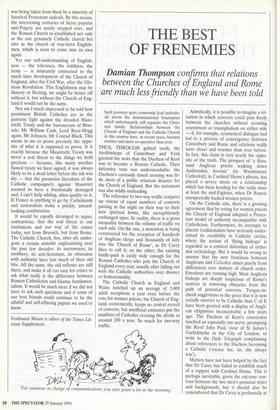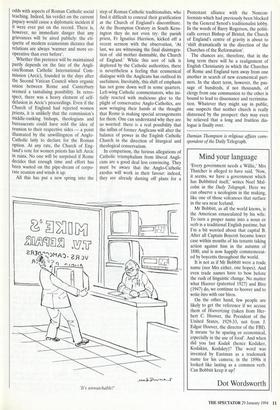THE BEST OF FRENEMIES
Damian Thompson confirms that relations between the Churches of England and Rome are much less friendly than we have been told
Such journeys quite commonly lead individu- als across the denominational boundaries which unfortunately still separate the Chris- tian family. Relationships between the Church of England and the Catholic Church in this country have, in recent years, become warmer and more co-operative than ever.
THUS, THROUGH gritted teeth, the Archbishops of Canterbury and York greeted the news that the Duchess of Kent was to become a Roman Catholic. Their defensive tone was understandable: the Duchess's curiously timed crossing was lit- tle short of a public relations disaster for the Church of England. But the statement was also wildly misleading.
The reference to two-way traffic conjures up visions of equal numbers of converts passing in the night on their way to their new spiritual home, like surreptitiously exchanged spies. In reality, there is a gross inequality between the volume of traffic on each side. On the one, a motorway is being constructed for the reception of hundreds of Anglican clergy and thousands of laity into the 'Church of Rome', as Dr Carey likes to call it; on the other, the existing bridle-path is easily wide enough for the Roman Catholics who join the Church of England every year, usually after falling out with the Catholic authorities over divorce or homosexuality.
The Catholic Church in England and Wales notched up an average of 5,000 adult receptions a year even before the vote for women priests; the Church of Eng- land, conveniently, keeps no central record of converts, but unofficial estimates put the numbers of Catholics crossing the divide at around 200 a year. So much for two-way traffic.
'For someone in charge of communications you sure grunt a lot in the morning.' Admittedly, it is possible to imagine a sit- uation in which converts could pass freely between the churches without arousing resentment or triumphalism on either side — if, for example, ecumenical dialogue had led to a process of convergence between Canterbury and Rome and relations really were closer and warmer than ever before.
In fact, this claim is very nearly the oppo- site of the truth. The prospect of 'a thou- sand Anglican priests walking down Ambrosden Avenue' (to Westminster Cathedral), in Cardinal Hume's phrase, has placed a severe strain on a relationship which has been heading for the rocks since at least the mid-Eighties, when Dr Runcie unexpectedly backed women priests.
On the Catholic side, there is a growing agreement that by voting for women priests the Church of England adopted a Protes- tant model of authority incompatible with Catholicism. Furthermore, its attempts to placate traditionalists have seriously under- mined its credibility in Catholic circles, where the notion of 'flying bishops' is regarded as a comical distortion of ortho- dox ecclesiology. But it would be wrong to assume that the new frostiness between Anglicans and Catholics arises purely from differences over matters of church order. Emotions are running high. Most Anglican bishops are deeply suspicious of Rome's motives in removing obstacles from the path of potential converts. Tongue-in- cheek suggestions in the press that it is now socially smarter to be Catholic than C of E have been greeted with a display of Angli- can chippiness inconceivable a few years ago. The Duchess of Kent's conversion touched an especially raw nerve, prompting the Revd John Paul, vicar of St James's Garlickhythe in the City of London, to write to the Daily Telegraph complaining about references to the Duchess becoming a Catholic ('excuse me, sir, she always was').
Matters have not been helped by the fact that Dr Carey has failed to establish much of a rapport with Cardinal Hume. This is perhaps inevitable, given the extreme con- trast between the two men's personal styles and backgrounds; but it should also be remembered that Dr Carey is profoundly at odds with aspects of Roman Catholic social teaching. Indeed, his verdict on the current papacy would cause a diplomatic incident if it were ever put on the record. There is, however, no immediate danger that any grievances will be aired publicly: the eti- quette of modern ecumenism dictates that relations are always 'warmer and more co- operative than ever before'.
Whether this pretence will be maintained partly depends on the fate of the Angli- can/Roman Catholic International Com- mission (Arcic), founded in the days after the Second Vatican Council when organic union between Rome and Canterbury seemed a tantalising possibility. In retro- spect, there was a heavy element of self- delusion in Arcic's proceedings. Even if the Church of England had rejected women priests, it is unlikely that the commission's middle-ranking bishops, theologians and bureaucrats could have sold the idea of reunion to their respective sides — a point illustrated by the unwillingness of Anglo- Catholic laity to declare for the Roman option. At any rate, the Church of Eng- land's vote for women priests has left Arcic in ruins. No one will be surprised if Rome decides that enough time and effort has been wasted on the pipe-dream of corpo- rate reunion and winds it up.
All this has put a new spring into the step of Roman Catholic traditionalists, who find it difficult to conceal their gratification at the Church of England's discomfiture. At the Brompton Oratory in South Kens- ington they do not even try: the parish priest, Fr Ignatius Harrison, kicked off a recent sermon with the observation, 'At last, we are witnessing the final disintegra- tion of old mother damnable, the Church of England.' While this sort of talk is deplored by the Catholic authorities, there is nevertheless a feeling that ecumenical dialogue with the Anglicans has outlived its usefulness. Inevitably, this shift of emphasis has not gone down well in some quarters. Left-wing Catholic commentators, who ini- tially reacted with malicious glee to the plight of conservative Anglo-Catholics, are now wringing their hands at the thought that Rome is making special arrangements for them. One can understand why they are so worried: there is a real possibility that the influx of former Anglicans will alter the balance of power in the English Catholic Church in the direction of liturgical and theological conservatism.
In comparison, the furious allegations of Catholic triumphalism from liberal Angli- cans are a good deal less convincing. They must be aware that the Anglo-Catholic exodus will work in their favour: indeed, they are already dusting off plans for a `It's unwatchable!' Protestant alliance with the Noncon- formists which had previously been blocked by the General Synod's traditionalist lobby. In the words of Barry Rogerson, the politi- cally correct Bishop of Bristol, the Church of England's centre of gravity is about to `shift dramatically in the direction of the Churches of the Reformation'.
The chances are, therefore, that in the long term there will be a realignment of English Christianity in which the Churches of Rome and England turn away from one another in search of new ecumenical part- ners. In the short term, however, the pas- sage of hundreds, if not thousands, of clergy from one communion to the other is bound to lead to dissonance and recrimina- tion. Whatever they might say in public, one suspects that neither church is really distressed by the prospect: they may even be relieved that a long and fruitless dia- logue is finally over.
Damian Thompson is religious affairs corre- spondent of the Daily Telegraph.



































































 Previous page
Previous page